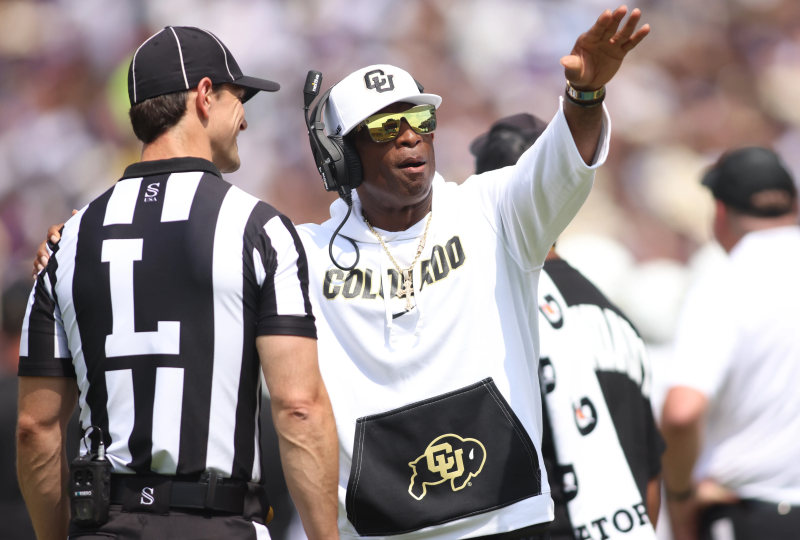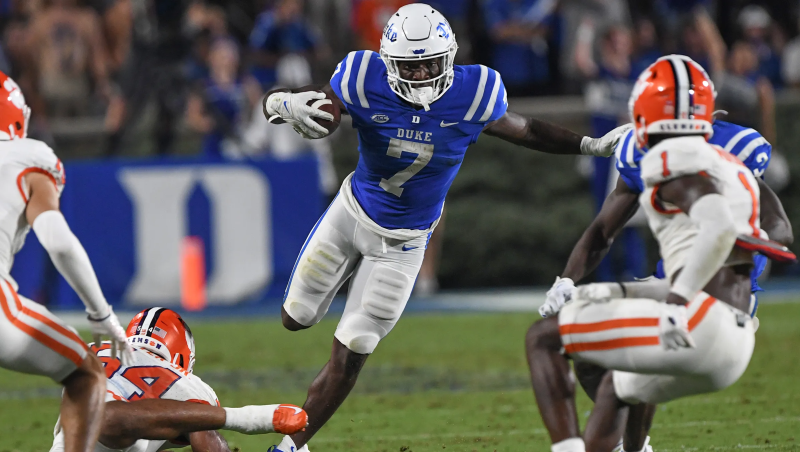Deion Sanders, Colorado start fast with rebuild challenging college football establishment
No. 25 Colorado and Nebraska will meet Saturday under similar and very different circumstances. Both teams are led by first-year head coaches: Deion Sanders at Colorado and Matt Rhule at Nebraska. Both are attempting to rebuild down-on-their-luck programs. Both have leaned on the transfer portal to update rosters lacking the pieces to compete at a high level in the Power Five.
But while Rhule's method to roster management may be outside the box compared to the broader history of college football, which has seen coaches steadily rebuild a roster over the course of two or more years, the way Nebraska has attacked the offseason isn't foreign in the era of the portal and widespread player movement.
"I think it’s just about being real," Rhule said of his first-year approach. "Understanding exactly where you are and constant improvement. Just preaching improvement. So if you’re great, you want to be greater. That’s really important to me. Let’s be real about where we are."
Sanders, on the other hand, spent his first nine months performing an unprecedented overhaul. Only nine scholarship players were retained from last year's roster. He's brought in 68 new scholarship players, including 13 from programs in the SEC. Another handful of players followed Sanders from Jackson State, including his son, Shedeur, the Buffaloes' starting quarterback, and sophomore Travis Hunter, a former five-star prospect.

Call it the Deion Sanders effect. Since leaving Jackson State for Colorado, Sanders has performed the most drastic, stem-to-stern rebuild in this or any era of college football. The makeover is, in a word, unparalleled.
"It had to be," Sanders told USA TODAY Sports.
Everyone was watching as the Buffaloes opened the Sanders era against TCU, the defending national runner-up: Was he a trailblazer, or did he bite off more than he and the Buffaloes can chew?
CALM DOWN: Week 1 overreactions led by Colorado, Ohio State
RE-RANK:Florida State, Penn State join top five of the NCAA 1-133
The rebuild is taking off, at least so far: Colorado upset the Horned Frogs 45-42 as roughly a three-touchdown underdog, validating Sanders' approach and the hype, attention and intrigue that had come along with his unique roster turnover.
Even after just one game, it's evident that Sanders' blueprint for Colorado could quickly become the most popular rebuilding model for first-year Bowl Subdivision head coaches, ushering in an environment where new coaches and staffs have not just the ability to shuffle out dozens of incumbent players but the evidence that the approach actually works.
"You don’t take over a business and don’t change the personnel," said Sanders.
All along, the question was never whether Sanders could bring in talent. Hunter was one of the top prospects in his class and could've gone to the FBS program of his choice; he chose Jackson State because of Sanders, and then chose Colorado because of Sanders. Among four-year recruits, the Buffaloes signed, among others, five-star cornerback Cormani McClain and four-star running back Dylan Edwards, who had 159 yards of total offense and four touchdowns on just 11 offensive touches against the Horned Frogs.
The unceremonious departures of dozens of holdovers have come with some degree of criticism from established college coaches who have needed to adapt to the new, transfer-heavy landscape.
In the spring, Pittsburgh coach Pat Narduzzi said Sanders' plan "looks bad on college football coaches across the country."
Later, during Big 12 media days in July, second-year Oklahoma coach Brent Venables said he "challenged the guys" heading into his first season.
"I wasn’t like Deion that gave guys a bunch of pink slips,” he said. “I gave guys 12 months of grace to go to class, live right off the field and show up with a great urgency and respect for your opportunity at the University of Oklahoma."
Sanders cited the unique situation at Colorado in response, adding about Narduzzi, "I don’t know who he is. If he walked in here right now, I wouldn’t know him."
And the changes that came about this offseason didn't come as a shock to the returning roster, Sanders said, "Because they knew."
"That wasn’t a shocker. Because when we come in, the standard that we desire, if you’re not willing to turn it up and make it to the standard, we have a problem. And they don’t realize that most of the people, they left on their own. We didn’t even have to nudge them. They looked around and said, ‘I can’t do this. Not what they want.’ They shut it down in droves.”
Instead, the question was whether Sanders and the Buffaloes' coaching staff could mold a group that had never played a single snap as a unit into a team capable of winning more than just three or four games.
The answer to that, at least after one game, is a resounding yes. Even if Colorado comes back to earth beginning with Saturday's rivalry clash against the Cornhuskers, Sanders has opened the door to an even more extreme version of the first-year roster flip: He has set a precedent for essentially swapping one roster for another in the course of one offseason, and other new coaches in the future are almost certainly going to follow this blueprint.
Yet how this dramatic undertaking unfolds in the next three months remains almost anyone's guess. TCU had undergone major offseason changes of its own, including the loss of quarterback Max Duggan, wide receiver Quentin Johnston and offensive coordinator Garrett Riley. Week 1 results are ripe for overreaction; the Buffaloes could've gotten the Horned Frogs on a bad day.
Despite its upcoming disintegration, the Pac-12 could be the second-best conference in the Power Five. The league went 12-0 in Week 1, posting the only perfect mark in the Power Five, with wins against TCU, Florida, Boise State and Coastal Carolina. The 13 games the league has played this season − No. 6 Southern California has played two games − have been decided by an average margin of victory of 27.7 points.
All but one of Colorado's remaining games come against Power Five competition, with rival Colorado State the exception. Given that Saturday's win was just the program's fourth against the Power Five in the past three years, there's still some skepticism over whether or not the Buffaloes are a real contender to remain in the US LBM Coaches Poll or destined to hover near bowl eligibility.
Unsurprisingly, Sanders is bullishly optimistic: "We’re gonna win. We’re gonna win. We’re gonna win," he said recently.

Disclaimer: The copyright of this article belongs to the original author. Reposting this article is solely for the purpose of information dissemination and does not constitute any investment advice. If there is any infringement, please contact us immediately. We will make corrections or deletions as necessary. Thank you.







